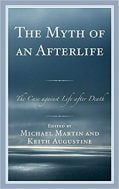
Rowman & Littlefield
ISBN: 9780810886773
This is a substantial compendium of papers – running to some 650 pages – examining the distinctly insubstantial thesis that we will somehow survive brain death. The thirty papers, drawing on work in developmental psychology, comparative psychology, neuroscience, behavioural genetics, evolutionary biology and philosophy of science, among other fields, are grouped in four main sections,: Empirical Arguments for Annihilation, Conceptual and Empirical Difficulties for Survival, Problematic Models of the Afterlife, and Dubious Evidence for Survival.
Given the scope and depth of the arguments and evidence presented, a comprehensive account here might leave room for little more than our journal’s title, so only a selection of the most striking chapters will be discussed.
Matt McCormick, in his chapter, Dead as a Doornail, expresses a pivotal argument about possibility and probability: “possibilities are easy to conceive of, but they aren’t reasonable to believe on that basis alone… Possibility doesn’t establish probability or reasonableness”.
The way in which we might assess the relative probabilities of rival hypotheses is discussed in a key section of the ninety-page centrepiece of the collection, Augustine and Fishman’s chapter, The Dualist’s Dilemma: The High Cost of Reconciling Neuroscience with a Soul, where they discuss Bayes’ Theorem. The independence hypothesis – that the mind is independent from the brain – can be criticised using Ockham’s Razor – the idea that we should prefer simple explanations that do not rely on multiple entities brought in ad hoc to cover the data that is to be explained. The status of this principle of parsimony has often been questioned, but Augustine and Fishman describe how Ockham’s Razor can acquire an objective basis by combining Bayesian confirmation theory with algorithmic information theory. The upshot is that, “the dependence thesis is vastly more probable than the independence thesis. Accordingly, the independence thesis… should be rejected”.
In another notable chapter, it feels nothing short of a privilege to have a consultation with neurologist David Weisman, who shares his clinical experiences of one of his patients.
The patient “was once a child, and before that he was an infant. Like all of us, he started life aphasic… As his brain matured, linguistic ability developed. Eventually, a mind emerged. Then his brain grew a tumour and became dysfunctional, diminishing his linguistic ability and then his consciousness. Before he had any brain at all, he was in the same state as that which followed the death of his brain”.
Weisman notes, with the candour and conciseness he might employ in his medical notes, “this seems to be the deal”.
Although every chapter rewards close reading, Ingrid Hansen Smythe’s paper, Objections to Karma and Rebirth, scores highly, perhaps due to its very amusing satirical slant. The disastrous follies of reincarnation and the pop-religious clichés of karma are deftly filleted in a sharp and accessible style. Regarding the “ethics” of karma, she argues that, “imagining that we can accurately measure the ethics of our actions is a strangely puerile delusion”.
What all these papers show is how quickly a range of insurmountable problems arise as soon as implications are drawn out from the unconsidered and cosseted beliefs of those devoted to rebirth and survival. As long as people pick and mix their ideas without acknowledging the logical relations between them, they will wallow in delusions. The arguments in this excellent book should sway the open-minded. It is also bulky enough for self-defence.
Paul Taylor



